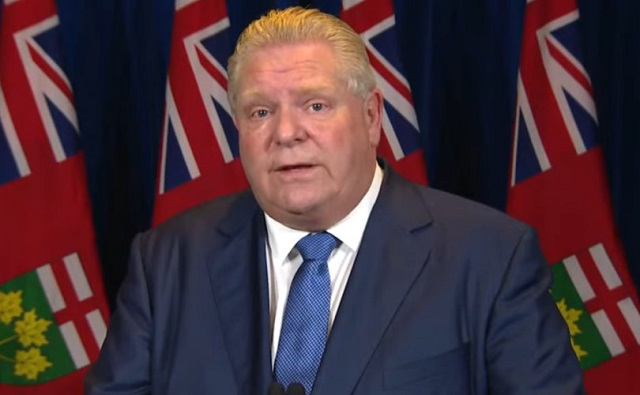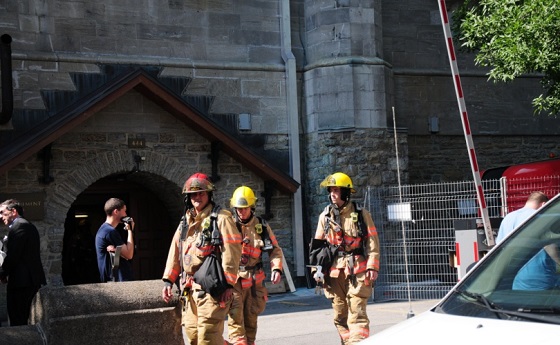Business
Taxpayers Federation urging Ontario to join Alberta’s carbon tax court fight

From the Canadian Taxpayers Federation
By Jay Goldberg
The Canadian Taxpayers Federation is calling on Ontario Premier Doug Ford to join the Alberta government and constitutionally challenge against the federal carbon tax.
“Ford has rightly opposed the federal carbon tax for years, but now he has a new chance to beat it in court,” said Jay Goldberg, CTF Ontario Director. “Last time the carbon tax fight went to the Supreme Court, the federal government argued it needed a national carbon tax to deal with a national problem. But then it undercut its own argument for a national carbon tax by making an exception for furnace oil, which clearly favours Atlantic Canada.
“Trudeau torpedoed his own constitutional argument for imposing a carbon tax so it’s time to challenge it in court again.”
Today, the Alberta government announced it has filed an application at the federal court challenging the constitutionality of the carbon tax in the wake of the federal government’s heating oil carbon tax exemption.
Last year, the federal government announced it is removing the carbon tax from heating oil for three years, but did not exempt other forms of home heating energy.
The carve-out disproportionately helps Atlantic Canadians. Only two per cent of Ontario households use furnace oil to heat their homes.
The average Ontario home uses 2,497 cubic metres of natural gas per year. That means removing the current federal carbon tax would save the average home about $381 this year.
“When Trudeau announced his heating oil carve out, he admitted the carbon tax makes life more expensive, he admitted the carbon tax is all about politics and he left the vast majority of Canadians out in the cold,” Goldberg said. “Ford needs to take this new opportunity to join other provinces and fight the carbon tax in court.”
A recent Leger poll commissioned by the CTF shows 60 per cent of Ontarians want the federal government to remove the carbon tax from all heating fuels.
Smith right to fight carbon tax in court
The Canadian Taxpayers Federation applauds Alberta Premier Danielle Smith for launching a renewed constitutional challenge against the federal carbon tax.
“The carbon tax is making the necessities of life in Alberta more expensive and that’s why Smith is right to take Prime Minister Justin Trudeau’s carbon tax back to court,” said Franco Terrazzano, CTF Federal Director. “Last time the carbon tax fight went to the Supreme Court, the federal government argued it needed a national carbon tax to deal with a national problem. But then it undercut its own argument for a national carbon tax by making an exception for furnace oil, which clearly favours Atlantic Canada.
“Trudeau torpedoed his own constitutional argument for imposing a carbon tax so it’s time to challenge it in court again.”
Today, the Alberta government announced it has filed an application at the federal court challenging the constitutionality of the carbon tax in the wake of the federal government’s home heating oil exemption.
Writing in the National Post, the CTF called on all premiers to launch a new legal challenge against the federal carbon tax.
Last year, the federal government announced it is removing the carbon tax from furnace oil for three years, but did not exempt other forms of home heating energy. Less than one per cent of Alberta households use heating oil.
The average Alberta home uses about 2,935 cubic metres of natural gas per year, according to Statistics Canada. That means scrapping the current federal carbon tax would save the average Alberta home about $440 this year.
“Taxpayers are taking it on the chin every time we pay our heating bills and Trudeau is torpedoing constitutional accountability with his unequal application of the carbon tax,” Terrazzano said. “When Trudeau announced his heating oil carve out, he admitted the carbon tax makes life more expensive, he admitted the carbon tax is all about politics and he left the vast majority of Canadians out in the cold.”
A recent Leger poll commissioned by the CTF shows 70 per cent of Albertans want the federal government to remove the carbon tax from all heating fuels.
Business
P.E.I. Moves to Open IRAC Files, Forcing Land Regulator to Publish Reports After The Bureau’s Investigation

Following an exclusive report from The Bureau detailing transparency concerns at Prince Edward Island’s land regulator — and a migration of lawyers from firms that represented the Buddhist land-owning entities the regulator had already probed — the P.E.I. Legislature has passed a new law forcing the Island Regulatory and Appeals Commission (IRAC) to make its land-investigation reports public.
The bill — introduced by Green Party Leader Matt MacFarlane — passed unanimously on Wednesday, CTV News reported. It amends the Lands Protection Act to require IRAC to table final investigation reports and supporting documents in the Legislature within 15 days of completion.
MacFarlane told CTV the reform was necessary because “public trust … is at an all-time low in the system,” adding that “if Islanders can see that work is getting done, that the (LPA) is being properly administered and enforced, that will get some trust rebuilt in this body.”
The Bureau’s report last week underscored that concern, showing how lawyers from Cox & Palmer — the firm representing the Buddhist landholders — steadily moved into senior IRAC positions after the regulator quietly shut down its mandated probe into those same entities. The issue exploded this fall when a Legislative Committee subpoena confirmed that IRAC’s oft-cited 2016–2018 investigation had never produced a final report at all.
There have been reports, including from CBC, that the Buddhist landholders have ties to a Chinese Communist Party entity, which leaders from the group deny.
In the years following IRAC’s cancelled probe into the Buddhist landholders, The Bureau reported, Cox & Palmer’s general counsel and director of land joined IRAC, and the migration of senior former lawyers culminated this spring, with former premier Dennis King appointing his own chief of staff, longtime Cox & Palmer partner Pam Williams, as IRAC chair shortly after the province’s land minister ordered the regulator to reopen a probe into Buddhist landholdings.
The law firm did not respond to questions, while IRAC said it has strong measures in place to guard against any conflicted decision-making.
Reporting on the overall matter, The Bureau wrote that:
“The integrity of the institution has, in effect, become a test of public confidence — or increasingly, of public disbelief. When Minister of Housing, Land and Communities Steven Myers ordered IRAC in February 2025 to release the 2016–2018 report and reopen the investigation, the commission did not comply … Myers later resigned in October 2025. Days afterward, the Legislative Committee on Natural Resources subpoenaed IRAC to produce the report. The commission replied that no formal report had ever been prepared.”
The Bureau’s investigation also showed that the Buddhist entities under review control assets exceeding $480 million, and there is also a planned $185-million campus development in the Town of Three Rivers, citing concerns that such financial power, combined with a revolving door between key law firms, political offices and the regulator, risks undermining confidence in P.E.I.’s land-oversight regime.
Wednesday’s new law converts the expectation for transparency at IRAC, voiced loudly by numerous citizens in this small province of about 170,000, into a statutory obligation.
Housing, Land and Communities Minister Cory Deagle told CTV the government supported the bill: “We do have concerns about some aspects of it, but the main principles of what you’re trying to achieve are a good thing.”
The Bureau is a reader-supported publication.
To receive new posts and support my work, consider becoming a free or paid subscriber.
Business
Mark Carney Seeks to Replace Fiscal Watchdog with Loyal Lapdog

After scathing warnings from interim budget officer Jason Jacques, Liberals move to silence dissent and install a compliant insider with “tact and discretion.”
It’s remarkable, isn’t it? After a decade of gaslighting Canadians about their so-called “fiscally responsible” governance, the Liberal Party, now under the direction of Mark Carney, finally runs into a problem they can’t spin: someone told the truth. Jason Jacques, the interim Parliamentary Budget Officer, was appointed for six months, six months. And within weeks, he did something this government considers a fireable offense: he read the books, looked at the numbers, and spoke plainly. That’s it. His crime? Honesty.
Here’s what he found. First, the deficit. Remember when Trudeau said “the budget will balance itself”? That myth has now mutated into a projected $68.5 billion deficit for 2025–26, up from $51.7 billion the year before. Jacques didn’t just disagree with it. He called it “stupefying,” “shocking,” and, this is the one they hate the most, “unsustainable.” Because if there’s one thing Ottawa elites can’t handle, it’s accountability from someone who doesn’t need a job after this.
But Jacques didn’t stop there. He pointed out that this government has no fiscal anchor. None. Not even a fake one. A fiscal anchor is a target, like a deficit limit or a falling debt-to-GDP ratio—basic stuff for any country pretending to manage its money. Jacques said the Liberals have abandoned even that pretense. In his words, there’s no clear framework. Just blind spending. No roadmap. No compass. No brakes.
And speaking of GDP, here’s the kicker: the debt-to-GDP ratio, which Trudeau once swore would always go down, is now heading up. Jacques projects it rising from 41.7% in 2024–25 to over 43% by 2030–31. And what happens when debt rises and growth slows? You pay more just to service the interest. That’s exactly what Jacques warned. He said the cost of carrying the debt is eating into core government operations. That means fewer services. Higher taxes. Slower growth. The burden gets passed to your children while Mark Carney gives another speech in Zurich about “inclusive capitalism.”
And let’s talk about definitions. Jacques flagged that the Liberals are now muddying the waters on what counts as operating spending versus capital spending. Why does that matter? Because if you redefine the terms, you can claim to be balancing the “operating budget” while secretly racking up long-term debt. It’s accounting gimmickry, a shell game with your tax dollars.
He also pointed to unaccounted spending, about $20 billion a year in campaign promises that haven’t even been formally costed yet. Add that to their multi-decade defense commitments, green subsidies, and inflated federal payroll, and you’re looking at an avalanche of unmodeled liabilities.
And just to make this circus complete, Jacques even criticized the way his own office was filled. The Prime Minister can handpick an interim PBO with zero parliamentary input. No transparency. No debate. Just a quiet appointment, until the appointee grows a spine and tells the public what’s really going on.
Now the Liberals are racing to replace Jacques. Why? Because he said all of this publicly. Because he didn’t play ball. Because his office dared to function as it was intended: independently. They’re looking for someone with “tact and discretion.” That’s what the job listing says. Not independence. Not integrity. Tact. Discretion. In other words: someone who’ll sit down, shut up, and nod politely while Carney and Champagne burn through another $100 billion pretending it’s “investment.”
Let’s be clear: this isn’t just about replacing a bureaucrat. It’s about neutering the last shred of fiscal oversight left in Ottawa. The Parliamentary Budget Officer is supposed to be a firewall between reckless political ambition and your wallet. But in Carney’s Canada, independence is an inconvenience. So now, instead of extending Jacques’ term, something that would preserve continuity and show respect for accountability, the Liberals are shopping for a compliant technocrat. Someone who won’t call a $68.5 billion deficit “stupefying.” Someone who’ll massage the numbers just enough to keep the illusion intact.
They don’t want an economist. They want a courtier. Someone with just enough credentials to fake credibility, and just enough cowardice to keep their mouth shut when the spending blows past every so-called “anchor” they once pretended to respect. That’s the game. Keep the optics clean. Keep the watchdog muzzled. And keep Canadians in the dark while this government drives the country off a fiscal cliff.
But let me say it plainly, thank god someone in this country still believes in accountability. Thank God Jason Jacques stepped into that office and had the guts to tell the truth, not just to Parliament, but to the Canadian people. And thank God Pierre Poilievre has the common sense, the spine, and the clarity to back him. While Mark Carney and his Laurentian elite pals are busy gutting oversight, rewriting the rules, and flooding the economy with borrowed billions, it’s men like Jacques who refuse to play along. He looked at the books and didn’t see “investment”—he saw a ticking fiscal time bomb. And instead of ducking, he sounded the alarm.
Poilievre, to his credit, is standing firmly behind the man. He understands that without a real watchdog, Parliament becomes a stage play, just actors and scripts, no substance. Backing Jacques isn’t just good politics. It’s basic sanity. It’s the minimum standard for anyone who still thinks this country should live within its means, tell the truth about its finances, and respect the people footing the bill.
So while the Liberals scramble to muzzle dissent and hire another smiling yes-man with a resume full of buzzwords and a Rolodex full of Davos invites, at least one opposition leader is saying: No. We need a watchdog, not a lapdog. And in a city full of spineless bureaucrats, that’s not just refreshing—it’s absolutely essential.
-

 Frontier Centre for Public Policy6 hours ago
Frontier Centre for Public Policy6 hours agoRichmond Mayor Warns Property Owners That The Cowichan Case Puts Their Titles At Risk
-

 Business7 hours ago
Business7 hours agoSluggish homebuilding will have far-reaching effects on Canada’s economy
-

 Business1 day ago
Business1 day agoCarney shrugs off debt problem with more borrowing
-

 Crime2 days ago
Crime2 days agoCBSA Bust Uncovers Mexican Cartel Network in Montreal High-Rise, Moving Hundreds Across Canada-U.S. Border
-

 Alberta23 hours ago
Alberta23 hours agoWhen Teachers Say Your Child Has Nowhere Else to Go
-

 armed forces2 days ago
armed forces2 days agoWhat A Second World War Aircraft Taught Me About Remembrance Day
-

 armed forces2 days ago
armed forces2 days agoWhy we keep getting Remembrance Day wrong
-

 National18 hours ago
National18 hours agoConservative bill would increase penalties for attacks on places of worship in Canada













